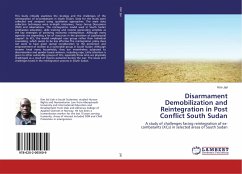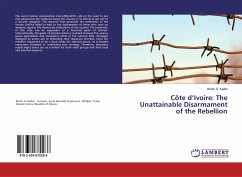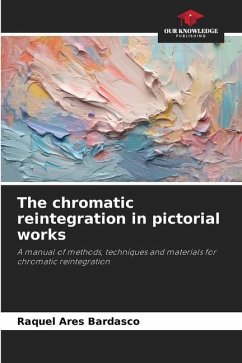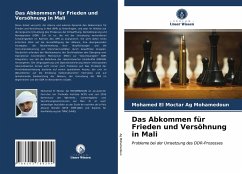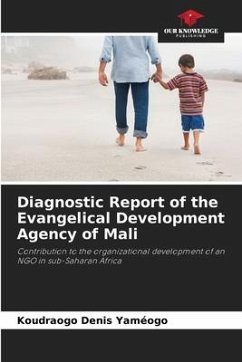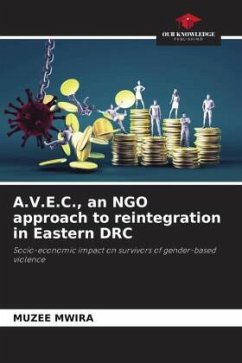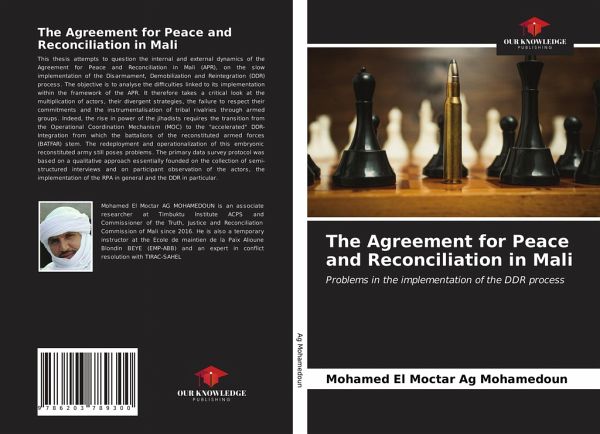
The Agreement for Peace and Reconciliation in Mali
Problems in the implementation of the DDR process
Versandkostenfrei!
Versandfertig in 6-10 Tagen
36,99 €
inkl. MwSt.

PAYBACK Punkte
18 °P sammeln!
This thesis attempts to question the internal and external dynamics of the Agreement for Peace and Reconciliation in Mali (APR), on the slow implementation of the Disarmament, Demobilization and Reintegration (DDR) process. The objective is to analyse the difficulties linked to its implementation within the framework of the APR. It therefore takes a critical look at the multiplication of actors, their divergent strategies, the failure to respect their commitments and the instrumentalisation of tribal rivalries through armed groups. Indeed, the rise in power of the jihadists requires the transi...
This thesis attempts to question the internal and external dynamics of the Agreement for Peace and Reconciliation in Mali (APR), on the slow implementation of the Disarmament, Demobilization and Reintegration (DDR) process. The objective is to analyse the difficulties linked to its implementation within the framework of the APR. It therefore takes a critical look at the multiplication of actors, their divergent strategies, the failure to respect their commitments and the instrumentalisation of tribal rivalries through armed groups. Indeed, the rise in power of the jihadists requires the transition from the Operational Coordination Mechanism (MOC) to the "accelerated" DDR-Integration from which the battalions of the reconstituted armed forces (BATFAR) stem. The redeployment and operationalization of this embryonic reconstituted army still poses problems. The primary data survey protocol was based on a qualitative approach essentially founded on the collection of semi-structured interviews and on participant observation of the actors, the implementation of the RPA in general and the DDR in particular.
This thesis attempts to question the internal and external dynamics of the Agreement for Peace and Reconciliation in Mali (APR), on the slow implementation of the Disarmament, Demobilization and Reintegration (DDR) process. The objective is to analyse the difficulties linked to its implementation within the framework of the APR. It therefore takes a critical look at the multiplication of actors, their divergent strategies, the failure to respect their commitments and the instrumentalisation of tribal rivalries through armed groups. Indeed, the rise in power of the jihadists requires the transition from the Operational Coordination Mechanism (MOC) to the "accelerated" DDR-Integration from which the battalions of the reconstituted armed forces (BATFAR) stem. The redeployment and operationalization of this embryonic reconstituted army still poses problems. The primary data survey protocol was based on a qualitative approach essentially founded on the collection of semi-structured interviews and on participant observation of the actors, the implementation of the RPA in general and the DDR in particular.
This thesis attempts to question the internal and external dynamics of the Agreement for Peace and Reconciliation in Mali (APR), on the slow implementation of the Disarmament, Demobilization and Reintegration (DDR) process. The objective is to analyse the difficulties linked to its implementation within the framework of the APR. It therefore takes a critical look at the multiplication of actors, their divergent strategies, the failure to respect their commitments and the instrumentalisation of tribal rivalries through armed groups. Indeed, the rise in power of the jihadists requires the transition from the Operational Coordination Mechanism (MOC) to the "accelerated" DDR-Integration from which the battalions of the reconstituted armed forces (BATFAR) stem. The redeployment and operationalization of this embryonic reconstituted army still poses problems. The primary data survey protocol was based on a qualitative approach essentially founded on the collection of semi-structured interviews and on participant observation of the actors, the implementation of the RPA in general and the DDR in particular.



